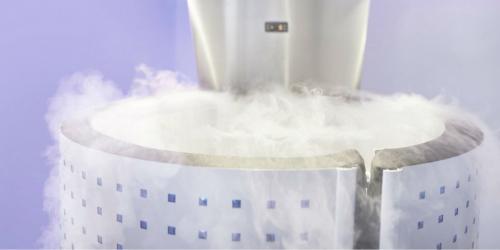We have scarcely returned that weariness is watching us. Between the resumption of the daily grind, the decrease of sunshine and the night that falls earlier and earlier, the dynamism takes a hit.
But no, this time, we will not let ourselves be won over by the ambient lethargy . Not to be part of these people leached as soon as the fall and enter the fall in punchy mode, it is better to set up today an effective attack program ... and realistic.
Sleep enough
"In order to have more energy during the day, we have to start by improving the quality of our sleep," insists Professor Damien Léger, head of the Sleep Center at the Hôtel-Dieu hospital in Paris and president. of the National Institute of Sleep and Vigilance (INSV)
It is during the night that the saving of essential energy is organized to prepare the body to face correctly the following day: fall of the respiratory and respiratory rate, fall of the temperature, repair of the damaged muscle tissues, restoration of the immune defenses ... In case of deficient sleep, the optimal conditions necessary for our daily performance and our energy balance are not met.
Go to bed at regular times, avoid naps for more than half an hour in the afternoon, do not abuse excitants (coffee, tea ...) after 17 hours, stop the computer and video games at least an hour before going to bed and getting a minimum of seven hours of sleep a night are the first rules to adopt.
But that's not enough, especially when you live on a hectic tempo and the pressure is huge.
Move more
"Physical activity is a great way to get rid of stress and increase the restorative effect of sleep," says Pr Leger, "acting on the biological clock in a similar way to intense light by resynchronizing the circadian rhythm of the body. " In addition, it transforms nervous fatigue into physical fatigue, which in particular favors deep sleep with slow waves: the most regenerative.
An American study, conducted in April 2008 at the University of Georgia, clearly showed that the practice of physical activity, even at low intensity, was enough to get the most "raplaplas" of us. Thirty-six volunteers in good health but lacking energy were divided into two groups. Some had to participate in three weekly gymnastics sessions, the others remained inactive, without their way of life being different. At the end of six weeks, the verdict was conclusive: the first felt much less exhausted than the latter.
Their signs of fatigue had decreased by 65% and their energy had increased by 20%. Of course, the more physical exertion is sustained, the greater the gain, probably due to the production of endorphin (well-being hormone) that triggers to alleviate the feeling of pain when the muscle cells begin to suffer .
For proof: researchers from the University of Tel Aviv (Israel) followed for 1,6 years 1,632 executives exhausted by an overflow of professional stress. Their work, published in January 2012 in The Journal of Applied Psychology, clearly established the existence of a causal relationship between their sporty schedule and their capacity for physical and intellectual resistance. Employees who regularly engaged in sports four hours a week did not fall into burn-out, as opposed to those who did less. But beware, "Do not overdo it," warns Dr. Christophe Lelong, sports doctor.For six hours a week, fatigue takes over.
The ideal is to practice twenty to forty minutes of exercises two or three times a week.
Control your sweet urges
In case of a stroke, we think that sugar will give us a revival of vitality. Well, not at all !
Unless you have skipped a meal, provided intense physical exertion or experienced a strong emotion, it is unlikely that you are in real hypoglycemia.
Due to its anxiolytic action, sugar certainly produces a feeling of temporary well-being, but the energy it provides is of poor quality. And the backlash is violent: a few hours after swallowing fast sugar, we are even more tired than before. By binding to proteins, a reaction known as glycation, sugar blocks the release of energy. Result: our cells are dysfunctional and our body is exhausted.
Eating useful
Being in the best of shape without a healthy and diverse diet is also mission impossible.
First step, fill up on vitamins C and B. Think of red pepper (three times richer in vitamin C than orange), broccoli flowers, blackcurrant, mango or kiwi.
Another source of anti-fatigue nutrients, wheat germs, rich in vitamins B1, B2, B6 and B9, necessary for the assimilation of complex carbohydrates that give energy, and zinc, essential for strengthening immune defenses. Rabbit, veal liver, lamb or poultry, and seafood are interesting for their high content of vitamin B12, essential for the formation of red blood cells and therefore a good oxygenation of tissues.
We also force on magnesium, the mineral of tonus par excellence. Recommended intakes (350 mg / day in women and 420 mg / day in men) are far from being reached for many of us (one in four women would be deficient).
In question ? Repetitive diets, stress, hormonal treatments, certain medications (insulin, diuretics ...) and an unbalanced diet.
To remedy this deficit, focus on green vegetables, whole grains, pulses (lentils, peas ...) and oilseeds (almonds, walnuts ...), and choose mineralized waters (Hépar, Badoit or Contrex type). ), which display more than 80 mg of magnesium per liter. To increase intakes, it can also absorb in the form of ampoules or tablets. The most interesting are the so-called third generation glycerophosphate-based (D-Stress, Uvimag B6, MagDyn, etc.). Unlike the others (chlorides or organic salts), they have no laxative effects and are well assimilated by the body.
Regulate mood with tryptophan
To recharge one's batteries, one also has tryptophan, "an amino acid involved in the synthesis of serotonin, hormone that drives the emotional state and the sequence of sleep cycles," explains Dr. Yann Rougier, co-founder of the Institute of Neuronutrition and Applied Neuroscience (IN2A).
Serotonin is also a precursor of melatonin, the famous hormone that governs the regulation of our biological clock.
Tryptophan is found in dairy products, meat, cereals such as wheat, barley, rye, rice, parsley, squash seeds and soybeans.
"But for this amino acid to cross the door of the brain, it must be accompanied by starchy foods (pasta, rice ...)," said Dr. Rougier.If we have difficulty falling asleep, two cookies and a complete Yogurt at the snack should help us.
If our nights are chopped, we drink rather in this case of tryptophan at dinner. On the other hand, if you sleep like a stump but you wake up tired, it's better to drink four cups of green tea a day. "It's stuffed with theanine, an amino acid that stimulates your serotonin and soothing alpha waves in the brain," says Dr. Rougier.
Dietary supplements that contain it (ChronoActiv Energy) also give spring. To try when one feels at the end of the roll.
Rebalance your hormones
But faced with a tenacious fatigue, it is essential to turn to his doctor.
Many hidden organic disorders and undiagnosed diseases can pump all our energy. An important urinary tract infection, for example, is exhausting as the body battles bacteria that have broken in. A viral infection (hepatitis or mononucleosis) puts more on your knees. Anemia (hemoglobin lower than 13 g / dl in men and 12 g / dl in women) also reduces the amount of oxygen transported to different organs.
Another very common cause of low tone: a hormonal imbalance, especially thyroid.
The thyroid gland plays a vital role since it orchestrates basic energy metabolism, heart rate, transit speed, body temperature, and so on. However, it turns out that its operation is increasingly disrupted. One in ten women over the age of 45 is reported to have a failing thyroid, slowing their body in slow motion. Signs of hypothyroidism are diffuse (fatigue, chills, cramps, unexplained weight gain, pale complexion, hair loss, etc.), so not always easy to identify. Only medical examinations (TSH assay, antithyroid antibody test, ultrasound of the gland ...) make it possible to establish the diagnosis and to find the cause: iodine deficiency, autoimmune disease ...
Other hormonal deficits may also be responsible: a deficiency of dopamine, the hormone of motivation, or cortisol, the stress hormone. If the latter runs out, the early morning can become a real superhuman effort. All this can be corrected with a huge profit: in a few weeks, we recover a beautiful energy to fully enjoy all the pleasures of life.
Bet on anti-fatigue plants
Two medicinal plants have anti-fatigue properties now scientifically proven.
- Ginseng first, which, contrary to what we believe, is not an exciting but a stimulant. The World Health Organization (WHO) recognizes as "clinically established" its use to "improve physical and mental capacities during fatigue, exhaustion, concentration disorders and convalescent persons". Its active ingredients (B vitamins and ginsenosides) promote communication between the cells. Take a cure of ten to twenty days in the form of powder (a teaspoon sprinkled on food) or capsules.
- Rhodiola also has a "whiplash" action thanks to its content of caffeic acid, catechin and salidroside, which stimulate the production and transport of neuromediators in the brain. Ideal when you're hard at work. Make a cure of at least one month, one capsule (360 mg) per day.


